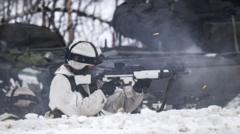As tensions escalate, Sweden calls for vigilance against foreign interference and domestic extremism issues.
Sweden Identifies Russia as Primary Security Threat Amid Rising Tensions

Sweden Identifies Russia as Primary Security Threat Amid Rising Tensions
Sweden's security service highlights concerns regarding Russian influence, claiming it undermines NATO and domestic stability.
Sweden's security service, Sapo, has labeled Russia as the most significant threat to its security, citing the nation's aggressive posture towards the West. In its latest annual report, Sapo emphasized that while Sweden’s accession to NATO has bolstered its security framework, it has simultaneously incited heightened Russian intelligence activities. Russia has refuted these claims and continues to deny any misconduct.
According to Sapo, the security landscape in Sweden has become serious, with heightened activities from foreign powers reflecting a new level of aggressiveness through hybrid warfare and violent extremism. Charlotte von Essen, head of Sapo, warned of a "tangible risk" that Sweden's security context could deteriorate, potentially in unpredictable ways.
Sweden, which joined NATO last year, perceives its alliance with the organization as a vital safeguard against the backdrop of Russia’s full-scale invasion of Ukraine in February 2022. Earlier this year, the Swedish civil defense minister suggested that a war on Swedish soil was plausible given the surrounding geopolitical climate.
Sapo's recent findings indicate that Russian intelligence efforts focus on disrupting NATO unity, counteracting Western support for Ukraine, and circumventing international sanctions. The agency noted that Russia's operations were becoming more offensive and increasingly risk-oriented, particularly as Swedish and European defense measures ramp up. In gathering intelligence, Russia reportedly employs a variety of resources and platforms to enhance its effectiveness, though recent actions to expel intelligence officers have constrained these efforts.
Ms. von Essen remarked on the necessity for the Swedish populace to remain vigilant against "widespread anti-state narratives and conspiracy theories" that may destabilize the nation. She emphasized the importance of not normalizing the evolving security situation.
The report also raised concerns about suspicious incidents related to critical infrastructure, with a mention of damage to undersea cables and gas pipelines amid the ongoing conflict in Ukraine. NATO has initiated monitoring operations in response to these attacks, the most recent occurring near Gotland, Sweden's largest island.
Sapo indicated an urgency in addressing the implications of a "terrible incident" in Orebro, Sweden, where nine lives were claimed by a mass shooting. Concurrently, Russia rejects any accusations of attempts to meddle with foreign democratic processes or sabotage economies.
Beyond Russia, Iran and China have also been identified as significant threats, with Sapo previously accusing Iranian intelligence of launching cyber-attacks against Sweden in response to incidents involving religious sensitivities. Both countries have disclaimed involvement in any hostile acts.
As Sweden grapples with a heightened sense of vulnerability, the threat matrix has evolved; terrorism is now seen to emanate not only from ideological groups but also from foreign instigators and youth radicalized through online platforms. Sapo has noted instances where nations like Russia and Iran have influenced individuals, typically young people, to commit violent acts.
Germany, France, and Austria have already faced serious attacks of this nature, accentuating the urgency for Sweden to address its own domestic security challenges, particularly after the devastating mass shooting incident last month. Sweden currently ranks its terrorism alert at a heightened level of four out of five, reflecting the seriousness of the threat landscape.





















